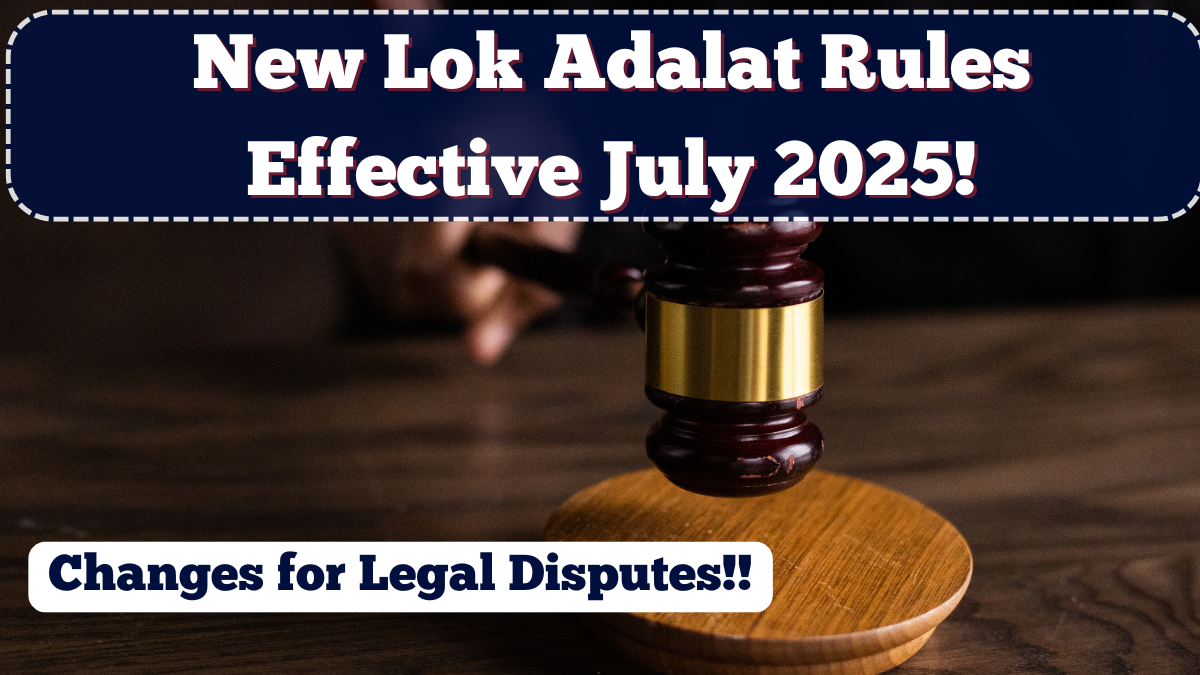The New Lok Adalat Rule July 2025 is now in force across all states, marking a major shift in how legal settlements are conducted in India’s alternative dispute resolution system. With the aim of reducing case backlogs and speeding up resolution, the reforms are designed to modernize the functioning of Lok Adalats.
From July 1, 2025, all Lok Adalats must adopt these new rules, making processes more efficient, accessible, and tech-enabled. The updated norms are especially focused on civil matters, pending cases, and pre-litigation disputes.
This legal reform India has been rolled out nationwide by the National Legal Services Authority (NALSA), in coordination with state-level Legal Services Authorities, to address increasing concerns over judicial delays.

Key Features of the Lok Adalat 2025 Reform
Here are the main highlights of the New Lok Adalat Rule July 2025:
-
Fast-track Resolution: Cases must be resolved within 45 days of registration in Lok Adalat.
-
Digital Submission: Parties can now submit documentation and forms online.
-
Virtual Hearings Introduced: In addition to physical hearings, video-based Lok Adalats are now permitted.
-
Mandatory Time Slots: Hearings will be strictly scheduled in fixed time windows to avoid delays.
-
Mobile Lok Adalats: Rural and tribal areas will have access to legal services through mobile units.
These changes under Lok Adalat 2025 aim to cut down the turnaround time of cases and reduce dependency on regular court proceedings for minor disputes.
Types of Cases Covered Under the New Rules
The July rules apply to the following types of disputes:
| Type of Case | Eligible for Fast-Track? |
|---|---|
| Motor Accident Claims | ✅ Yes |
| Money Recovery Cases | ✅ Yes |
| Matrimonial and Family Disputes | ✅ Yes |
| Labour and Employment Issues | ✅ Yes |
| Compoundable Criminal Offenses | ✅ Yes |
| Land and Property Disputes | ❌ No (Requires court direction) |
Only compoundable and civil nature disputes will be entertained under the New Lok Adalat Rule July 2025 without complex litigation procedures.
How Citizens Can Use the Updated Lok Adalat System
To benefit from the Lok Adalat 2025 process:
-
Check Case Eligibility: Visit the state’s Legal Services Authority website to confirm your case type.
-
Submit Application: Use the digital portal to fill out the Lok Adalat application or approach a local legal aid office.
-
Get Notified: If your case qualifies, you’ll be assigned a hearing date—either physical or virtual.
-
Resolve Dispute: On the assigned day, the case will be discussed, and a mutual agreement will be finalized.
-
Obtain Legal Seal: Once resolved, the judgment is binding and has the weight of a civil court order.
This updated process allows common citizens to resolve legal issues affordably, quickly, and without procedural complications under the July rules.
Impact of the July 2025 Lok Adalat Changes
This legal reform India brings multiple benefits:
-
Clears massive court case backlog
-
Increases access to justice for underprivileged groups
-
Reduces time and legal cost burdens on parties
-
Empowers local grievance redressal mechanisms
The New Lok Adalat Rule July 2025 has been welcomed by legal experts, bar councils, and judiciary members alike for pushing India closer to a truly efficient legal ecosystem.
FAQs
What is the New Lok Adalat Rule July 2025?
It refers to the updated guidelines effective from July 1, 2025, that streamline the functioning of Lok Adalats across India with faster timelines and digital options.
Are Lok Adalat decisions binding?
Yes, settlements made in Lok Adalats under Lok Adalat 2025 are final, binding, and carry the same effect as a court decree.
Can criminal cases be resolved in Lok Adalats?
Only compoundable criminal offenses are eligible under the New Lok Adalat Rule July 2025. Serious or non-compoundable offenses are not covered.
How do I apply for my case to be heard in Lok Adalat?
Applications can be submitted online via the respective Legal Services Authority portals or in person at district legal aid centers.
Will virtual hearings be accepted in all cases?
Yes, under the July rules, virtual hearings are now officially recognized and can be opted for by mutual consent of both parties.
Click here to know more.
